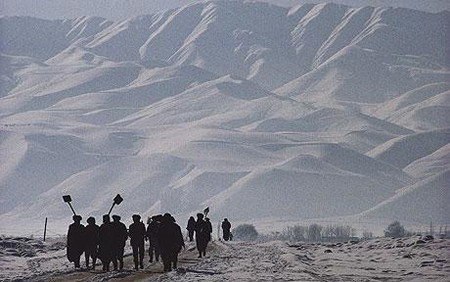By Hamid Shalizi and Emma Graham-Harrison
The hills around dusty Nor Aaba are laced with gold but villagers have blocked work on a new mine in a dispute over jobs, a warning that Afghan plans to ramp up mining may bring trouble as well as treasure.

A view of Takhar province in Northern Afghanistan. (Photo: CORBIS)
Security and corruption problems that have made fighting the insurgency and setting up a credible central government so difficult reach right up to this steep, isolated valley just a few miles from the Tajik border in northern Takhar province.
The mine contract promises work, roads, schools and clinics to an impoverished area and eventually $4-5 million a year in tax revenues to the government. None of it has arrived and the locals in an otherwise peaceful area are unhappy.
"The people are angry at the government, at the company and we have decided that no excavation will take place until our demands are met," said Mir Ahmad, a village leader.
"The government and the company is here for the gold, not here to help us," he said to applause from hundreds of villagers from Nor Aaba and surrounding hamlets.
Afghanistan is counting on huge mineral deposits, including some of the biggest unexploited copper and iron reserves in Asia, to wean it off its dependency on foreign aid. Copper production is due to start in 2013, the gold from Nor Aaba to flow earlier.
But in many developing nations the discovery of valuable oil or minerals has brought civil strife, rampant corruption and the paradoxical outcome of declining living standards for millions of citizens while an elite gets rich.
Afghan Mines Minister Wahidullah Shahrani has said he is aware of the dangers of the "resource curse" and confident he can steer his country along a path like Botswana's -- where diamond mines brought broad improvements in national living standards.
But obstacles include a raging insurgency that makes transit and security big headaches, weak infrastructure that hinders shipment of ore and monitoring of remote sites like Nor Aaba, weak rule of law meaning limited protection for ordinary citizens, and massive corruption in both the private sector and government.
BLOCKING WORK
The seam of gold at Nor Aaba is rich and extensive. It was washed out of volcanic rocks millions of years ago and deposited on the bed of a long-vanished lake, now turned into new layers of stone in hills cradling the village and the bed of its river.
Before Shahrani flew in to inspect progress he billed it as among the most promising short-term mining ventures in the country, soon to ramp up from test to production and with reserves in the area estimated at up to 24 tonnes of gold.
But as Shahrani's helicopter came in to land at the weekend, villagers eager to air their grievances ran up mountain tracks to reach the mine-side site chosen for the meeting.
"The company must promise to hire people from this village who need jobs, otherwise we won't let anyone work on these mines," warned Maolavi Azimullah, imam of the village mosque.
He and others said workers were being brought in from other areas to undercut wages, which were barely $100 a month, and loosen their hold on the mine. They also said the company had illegally started full-scale mining until blockaded.
Despite crippling poverty -- most locals scratch a living from subsistence farming or rely on remittances from relatives abroad -- villagers seemed certain they could keep operations stalled until their demands were met.
Abdul Jabar Taqwa, the governor of Takhar province, agreed.
"If we don't intervene the people will not even let the company start the machines," he told Shahrani after the meeting.
FLAWED CONTRACT
The minister blamed the problems at Nor Aaba on a flawed contract and lack of oversight by the ministry when it was run by his predecessor, who has been accused of corruption.
"The technical work has been good, I think now we need to focus on the social issues," Shahrani said on his return to Kabul, assigning a team of industry experts to work with mine owner Haji Abdul Kabir, an ethnic Uzbek.
There was certainly an impressive array of equipment, including earthmovers, lined up at the mine mouth for an area without even tarmac roads to bring them in. Kabir has also paid for Russian gold experts to update old surveys of the site.
"The government must support me, I have invested about $3.5 million here," he told Reuters at the mine.
But Kabir was unrepentant about the labour and operating practices of his company, Westland General Trading, saying he paid locals $200 a month -- a good salary in rural Afghanistan.
"The people are calm, the mullahs are the ones who provoke the villagers," he told Reuters. "They want a share of the gold."
"We will act according to provisions in the contract -- if they violate or deviate from the agreed framework then there are provisions of disciplinary measures to be taken," he said, adding monitors would be sent to look into villagers' concerns.
(Editing by Paul Tait and Andrew Marshall)



